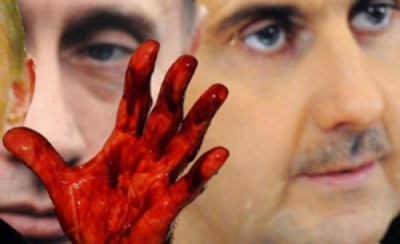 By David Ignatius
By David Ignatius
The answer to the Syrian tragedy isn’t complicated: It’s a political transition, starting now, from the regime of President Bashar al-Assad to a government of national unity that includes the opposition but also retains the basic structure of the Syrian state.
The entire world, outside Assad’s ruiling clique, supports this process. Even Russia, which is supposedly the Syrian dictator’s last friend, seems to be pulling away. Russian Foreign Minister Sergei Lavrov said Monday that while Syrians should decide the transition, “Russia is not tied to Assad’s staying in power.”
So why doesn’t it happen? The answer is that Russian President Vladimir Putin is playing a cynical game of power politics, delaying the transition that he nominally supports. He gives lip service to U.N. diplomacy as an alternative to war, but does nothing to advance it.
So the question shouldn’t be how to turn up the heat on Assad, but rather, how to turn up the heat on Putin. Washington needs to be more persuasive with Moscow, but the heavy lifting here will be done by America’s partners in the region—Turkey, Saudi Arabia, Egypt, Qatar, the United Arab Emirates, Pakistan, India—whose friendship or, at least, tolerance is important to Putin’s vision of Russian restoration.
Breast-beating about the President Obama’s decision not to intervene militarily misses the point that this is Russia’s failure, not America’s. Even Syria’s embattled Sunnis don’t want to see another American-led war in the region.
After Friday’s massacre of more than 100 civilians in the village of Houla, the Syrian regime is playing by “Houla rules,” to paraphrase my colleague Tom Friedman’s description of the “Hama rules” that Assad’s father Hafez used to obliterate Sunni resistance 30 years ago in another blood-soaked town in central Syria.
But the international community is still playing by “Kofi Annan rules,” as in the former U.N. secretary-general’s peace plan, which translates to waiting and hoping.
So let’s say it again: The right answer in Syria is clear. There must be a political transition that begins with the departure of the Assad-Maklouf family mafia, and moves to a broad-based government that includes the opposition (if it can get its act together) plus acceptable respresentatives of all the Syrian political factions and communities. Parliamentary elections would be set, and international peacekeepers would help restrain the score-settling and bloodletting that will surely follow Assad’s departure.
This process of change could begin tomorrow, if Russia would get serious. Putin can sponsor the talks, sign the peace deal, take a victory lap in Damascus, win a prize. But he has to get started now, or the Syrian mayhem will get worse, fast. And if he fails to act, the blood of future massacres will be on Putin’s hands.

Leave a Reply
You must be logged in to post a comment.